Radford Duck Ponds welcomed 6 new cygnets that hatched sometime between Friday night and Saturday the 7th of May 2011. They are pictured here newly hatched and then at approximately 6 weeks old.
The name ‘mute’ derives from it being less vocal than other swan species. It is recognisable by its pronounced knob atop of its bill. Swans feed in the water and on land. They are almost entirely herbivorous, although small numbers of aquatic animals may be eaten. In the water food is obtained by up-ending or dabbling, and their diet is composed of the roots, tubers, stems and leaves of aquatic and submerged plants.
Swans form monogamous pair bonds that last for many years, and in some cases these can last for life. Modern genetic techniques are starting to reveal that ‘divorces’ are more common than previously thought, as is mating with other swans outside of the social pairing, without breaking the social pair bond. These bonds are maintained year round. Unlike many other ducks and geese the male helps with the nest construction. Average egg size (for the mute swan) is 113×74 mm, weighing 340 g, in a clutch size of 4 to 7, and an incubation period of 34–45 days.
Although swans can be tame, especially to those who feed it daily, it is aggressive in defence of its nest. The cob is also responsible for defending the cygnets while on the water, and will sometimes attack small watercraft, such as canoes, that it feels are a threat to its young. The cob will also try and chase the predator out of his family territory, and will keep animals such as foxes and birds at bay.
The familiar pose with neck curved back and wings half raised, known as busking, is a threat display, mainly shown by males but also females to a small extent.
The phrase swan song refers to this swan and to the legend that it is utterly silent until the last moment of its life, and then sings one achingly beautiful song just before dying.
Socrates’ spoke the following words before being put to death in 399 BC: “You think I cannot see as far ahead as a swan. You know that when swans feel the approach of death they sing, and they sing sweeter and louder on the last days of their lives because they are going back to that god whom they serve.” (Plato)
More info on Swans & Cygnets
First brood picture ©2011 Steve Bates
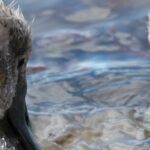
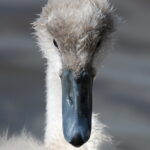
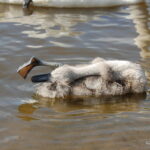
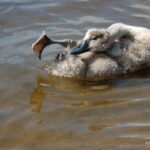
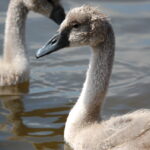
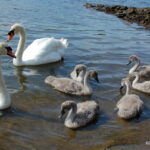
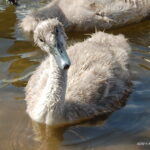
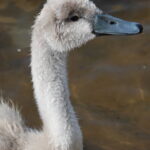
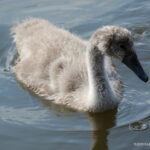
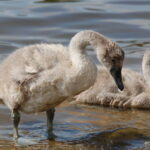
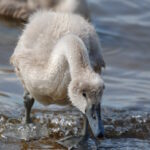
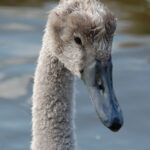
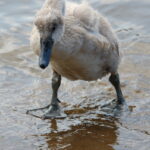
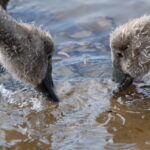
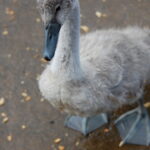
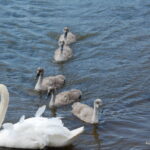
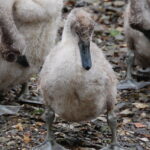
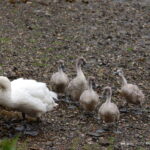
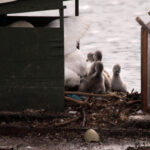
I had 6 cygnets arrive at sutton harbour plymouth on the 1st of december wondering if they are the the same ones from radford lake that hatched back in may 2011?? if they are they are they are all well and i hand feed them along with my other 25 adult swans.
23-9-11
Cygnet has swallowed ? fishing twine RSPCA are sending someone to help.
12.30pm
Thank you for such great photography.What attentive parents they are to have nurtured six offspring.More please!
Love the pictures of the Cygnets – Fantastic!